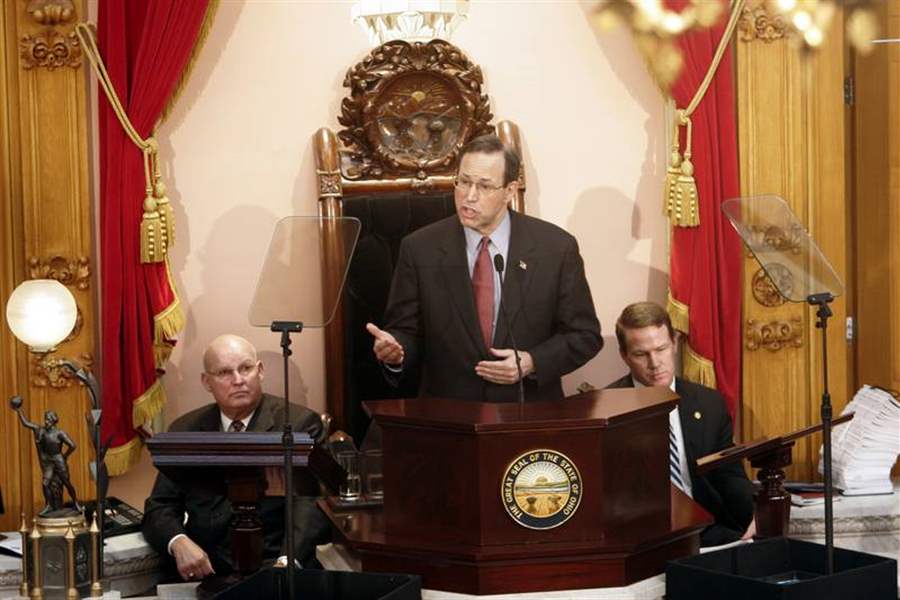
Taft: Raise education standards in Ohio; legislators react coolly to governor s speech
1/26/2006
Gov. Bob Taft delivers his final State of the State address.
COLUMBUS With just a passing reference to his problems of the last year, Gov. Bob Taft delivered his final State of the State address yesterday, receiving a largely lukewarm reception.
None of his policy proposals, including the centerpiece of more stringent K-12 course offerings to better prepare students for college, drew a standing ovation from legislators who otherwise were quick to their feet to honor First Lady Hope Taft and the Ohio National Guard.
There s no one sitting here in the chamber today that isn t aware of what went on [last year], said Rep. Stephen Buehrer (R., Delta). I think his acknowledgment that it was a tough year personally and professionally for him says it all.
He s still going to try to accomplish some things in the remaining 11 months, he said. I thought his goals today were modest but achievable.
The lame-duck governor s chief goal, patterned after the 2-year-old findings of his Governor s Commission on Higher Education, would mandate that all students take four years of math, three years of science, four years of English, three years of social studies, and at least two years of foreign language.
The changes would be implemented in time to affect the graduating class of 2011.
For too many, a high school diploma is not a passport to success, but rather a broken promise, Mr. Taft said. The world has raised the bar, and we must act to raise the bar for high school graduation. It s time to require all high school students to take a more rigorous core curriculum.
He also proposed requiring college students in need of remedial courses to take those classes at less expensive two-year community colleges.

Republican gubernatorial candidates Jim Petro, left, and Kenneth J. Blackwell, and former candidate Betty Montgomery hold a 'group hug,' as suggested by Mr. Blackwell, before the address.
More than 4 out of every 10 students attending college right out of high school need remedial course work in math or English, or both, Mr. Taft said. And these students are three-quarters less likely to graduate. Remedial classes don t count for graduation, but they cost our system $29 million a year.
The governor expanded on a proposal from House Speaker Jon Husted (R., Kettering) to target tuition grants toward those pursuing science, technology, engineering, and math degrees by including those planning to become science and math teachers.
While most listening to the proposal praised the concept, they are waiting to hear how he would pay for it. The state has provided little or no increases in support for higher education in recent years as it struggled with budgetary problems.
There s no appetite in the legislature to spend more if we don t expect more, state Sen. Randy Gardner (R., Bowling Green) said. Having said that, in order to make the kinds of gains we need to make, I don t think that can be done without investing more.
Ohio State University President Karen Holbrook called the proposal a good road map.
There s no better investment for the state than in education, she said. As the governor pointed out, this is the future for our country. Too many young people are not going into either college or some kind of career preparation that will provide them flexibility for a lifetime.
Terry Thomas, executive director of the Ohio Association of Community Colleges, said the 23 presidents of two-year schools have differing opinions on the idea of using them for remedial courses. We fully embrace that as part of our mission, he said. We can probably do it more affordably and more effectively than anyone else, but we don t want to be thought of exclusively in those terms. Being an access institution and a quality institution should not be mutually exclusive.
Alan Goodridge, provost at the University of Toledo, said the school is concerned about the diversion of remedial students away from four-year institutions.
If we were to lose all of our remedial classes to Owens or one of the other community colleges, and they were not replaced with any other students, it could cost us in excess of $3 million or $4 million, he said. This is a real issue for us, since we are so tuition-dependent for our budget.
Tom Mooney, president of the Ohio Federation of Teachers, said Ohio is not prepared to have the changes affect high school graduates in 2011, noting the foundation has yet to be laid in earlier grades.
The state must finally overhaul its school funding system, which remains unreliable, inequitable, and unconstitutional, he said. The current budget made things worse, not better, for many students. Most districts got flat funding or increases that don t even cover rising utility bills.
Sen. Teresa Fedor (D., Toledo) said she believes K-12 schools will end up having to foot the bill for the higher-level course offerings.
It looks likes a jigsaw puzzle that needs to be put together, but the pieces are being forced to fit, she said.
They should have started with this 10 years ago. If they want a seamless education system and accountability, they should have done it back then.
Mr. Taft s sole reference to his problems last year, including his guilty pleas to ethics violations for failing to report golf outings and other gifts, occurred when thanking his wife. He said they had learned the true meaning of for better or for worse.
I cannot believe that, in his last State of the State, the governor did not say, I m going to lead the effort to clean up corruption in this state, Senate Minority Leader C.J. Prentiss (D., Cleveland) said.
Many of Mr. Taft s policy initiatives involved proposals he has offered in the past that have yet to be enacted. His other proposals included:
• Passage of stalled legislation designed to address the business community s concerns about the calculation of workers compensation benefits.
• Passage of a bill cracking down on predatory practices in the home mortgage industry.
• Reform of Ohio s foster-care and adoption systems.
• Expansion of the school breakfast and lunch program by 120,000 more children.
• Legislative adoption of agreements with other states and Canada to protect Great Lakes water from being diverted to other regions.
• Passage of his package of tax credits and grants to benefit the struggling auto industry.
Contact Jim Provance at: jprovance@theblade.com 614-221-0496.